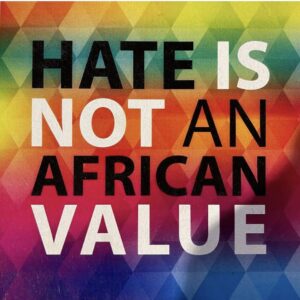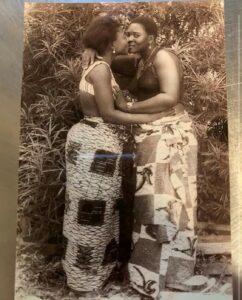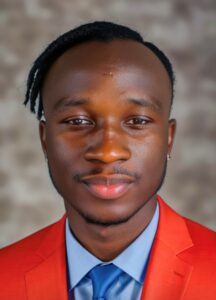I have struggled to put these thoughts into words, even as I remain in hiding because I have been doxed for standing up for myself and my community against the ugly claws of online homophobes. Alone and without much to do, I finally find the strength and the courage from resisting hate my entire adult life to finally to write this; “Every day of our lives, queer people in Africa are required to struggle, battle, and die to be accepted but it was not always like this. We did not always have to struggle and strive. At a time, we were royalty. We lived, we thrived, we married, and we grew old. We were celebrated. We added beautiful stripes to the cloth of the ancestral African weaver himself. It wasn’t always this bad.”
Among the Asantes, kings could marry male slaves and make them partners. That is the meaning of “Saso” – partner, mate, companion. In the Ga-Adangbe’s nonbinary and intersex people were the very creations of Ataa Naa Nyomo, the supreme deity. A god who is the defined personification of man and woman. A god that knew no sexual binaries. Both, a mother and father. In the Nzemas of Ghana and Ivory Coast, queer people partnered and married. The Ag)nwole Agyale relationships between women were common. We married, we had children. We produced and nurtured generations. In the Fante we were the light and heavy souls, the worshipped and the sacred. In the Nankani too, we married. Our diversity, our beauty, our strength. The weaver’s own masterpiece. We painted the weaver’s cloth and striped it. Our bold colours gleamed and shone within every culture in Ghana.
We weren’t only in Ghana. We were everywhere in Africa. Everywhere. We were in Nigeria as Yan Daudu, the male sex workers. In Uganda we were the Mudoko dako, the different gendered men among the Lango of northern Uganda. We were inkotshane in South Africa, the male wives. Lesotho called us motsoalle, the special friends. In Senegal we were gor-digen. As gods we manifested as the androgynous Esu Elegba, the Yourba god/dess of the crossroads. We were Mawu-Lisa of the Dahomey. As royalty we were Queen Nzingha Mbande from Angola and King Mwanga from Uganda. We were here, it wasn’t always this bad. It wasn’t.

So what happened? How did we get here? Why do we have to hide to hold the hands of people we love? When did our lives reduce to nothing but love in dark closets and alleys? In 1590, Andrew Battell, a British anthropologist whose extensive writing and documentation of Angola and Africa has long been a source of documented history, wrote this of the Imbangala of Angola: “They are beastly in their living, for they have men in women’s apparel, whom they keep among their wives.” Our cultures embraced so much diversity that we were called beastly.
When the white man arrived on the African soil he saw us. In our purest form , he saw us. But he had seen us before in his land. We called ourselves different things, but he had seen us among his people too. We existed in his land too, white and loved. He had pushed and shoved, huffed and puffed until the white people who looked like them but loved like us were criminalised. And he had put names on their love. Big bad names. “Sodomy”, “Unnatural carnal knowledge”, “Uranism”. They called them. Their own people, white like them.
After they dealt with them we were next. But it wasn’t only names, it was canes. It was slavery and patriarchy, homophobia and compulsory heterosexuality. They chained us, made us swear to gods we did not know after they burnt our gods and told us we were mistakes. They hanged on our necks despair and self-hate. They hired their best artisans to build ugly closets and shoved us deep inside beyond the reach of hands or light. Then they criminalised us, made laws that punished us with years in prison. For hundreds of years, they whipped our cultures from us, striped us of our sexualities and diversity. They forced our gods to depart from us and made us choose between conforming or death. Our culture eroded, our identities closeted.

When they finally chose to see our humanity several years after our ancestors fought and died, when they unwillingly decided to leave our ancestors, they left their laws.. They did not care. They left us stripped of our culture and theirs filling our heads. We sang their songs, spoke their language, hell, we even ate like them. We were modernised people. We worshipped their gods and our old days were in the past, gone and forgotten with the people who had been forcefully stacked in the closets. They had left behind years of self-hate, trauma, and disregard for anything that didn’t serve our new gods.
Oh and our new gods, our new gods hated the closeted ones. Our new gods required us to burn them in fires, encouraged us to beat them if they ever dared to step outside their closets. Our new gods commanded we destroy their lives and drown them in rivers. Our new gods who sacrificed their blood yet had an insatiable thirst for blood. Our new gods who preached love yet required us to hate. Despite the white ones leaving our heads filled with their new gods, despite them locking the dark closets with the chains they used to whip our ancestors, they still feared. They feared that we would go back and free the closeted ones. So they came together and donated power for us to criminalise and kill them.
So that is what we do. We pass laws and call for their heads. “Kill them. Rape them. Beat them.” We command, no! our former white masters and new gods command. So we act. We hope they suffer. We are modern people and this is what our new gods command. We do not tolerate abominations and foreign culture in this land, even if the abominations are our old gods and our closeted siblings.
And to us in the closet what do we do? We sing and we dance. We make merry and use the dark in our closets as pillows. We hold each other in loving assurances and sing in powerful hushed tones.
We are the living remnants and reminders of our ancestors who lived and loved. We may be in the closet today but we will not always be. One day we will hold the hands of our lovers and kiss them on the street without fear. We love, we dream, we work hard. We join hands and fight. We fight back, even when it seems like we are losing. We get up and charge, knowing that a win isn’t far away. We fight for the first ancestors who died in the closet. We let their dreams for a future where they will be free to love fill our heads like the dreams of a life after death fill the heads of the ignorant people worshipping new gods and pretending its theirs. We love and we celebrate, dance, and make fun of the folly of those hypocrites embracing cultures they do not know and praying to gods they cannot see. We remind us of what we are; Queer, Gay, Lesbian, Trans, Intersex. Loved and fighters. We are echoes from our closeted queer ancestors.
Feature photo by LGBT Rights Ghana
 Papa Kojo Ampofo (they/them/ono) is an intersex and gender nonconforming human rights activist based in Ghana. They work in curating and documenting the lives of the LGBTIQ+ community as well as the lived experiences of LGBTIQ+ elders in Ghana and West Africa. They have specific interests in championing economic empowerment, social inclusion and freedom that leads to the dismantling of harmful systems and liberation of indigenous queer people across Africa.
Papa Kojo Ampofo (they/them/ono) is an intersex and gender nonconforming human rights activist based in Ghana. They work in curating and documenting the lives of the LGBTIQ+ community as well as the lived experiences of LGBTIQ+ elders in Ghana and West Africa. They have specific interests in championing economic empowerment, social inclusion and freedom that leads to the dismantling of harmful systems and liberation of indigenous queer people across Africa.

A most beautifully written piece, thank you, Papa Kojo Ampofo!
A must-read! Please circulate!!